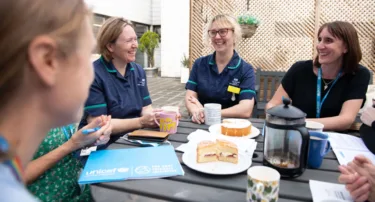Baby Friendly accreditation is based on a set of interlinking evidence-based standards for maternity, health visiting, community and hospital-based children’s services.
- Visit Going Baby Friendly: maternity, neonatal, community and hospital-based children’s services for more information on standards for each of these services, as well as links to download guidance and application forms.
- Visit About Baby Friendly to see our theory of change document, outlining the mechanism by which Baby Friendly impacts on long term public health outcomes.
These are designed to provide parents with the best possible care to build close and loving relationships with their baby and to feed their baby in ways which will support optimum health and development. Facilities implement the standards in stages over a number of years. At each stage they are externally assessed by UNICEF UK. When all the stages are passed they are accredited as Baby Friendly, and will ultimately go on to a Gold award and Achieving Sustainability, embedding the standards permanently. Award tables are kept to let the public know how facilities are progressing.
UNICEF UK also run a Baby Friendly programme for universities. Evidence based learning outcomes support midwifery and health visiting departments to ensure that their courses equip newly qualified midwives and health visitors to implement the Baby Friendly standards in the workplace. Universities implement the standards in stages and it is the course that is accredited as Baby Friendly.
Read more in the Guide to the Baby Friendly Standards.
The Baby Friendly Initiative provides a variety of courses and online training to support health professionals as they work towards the stages to full accreditation.



